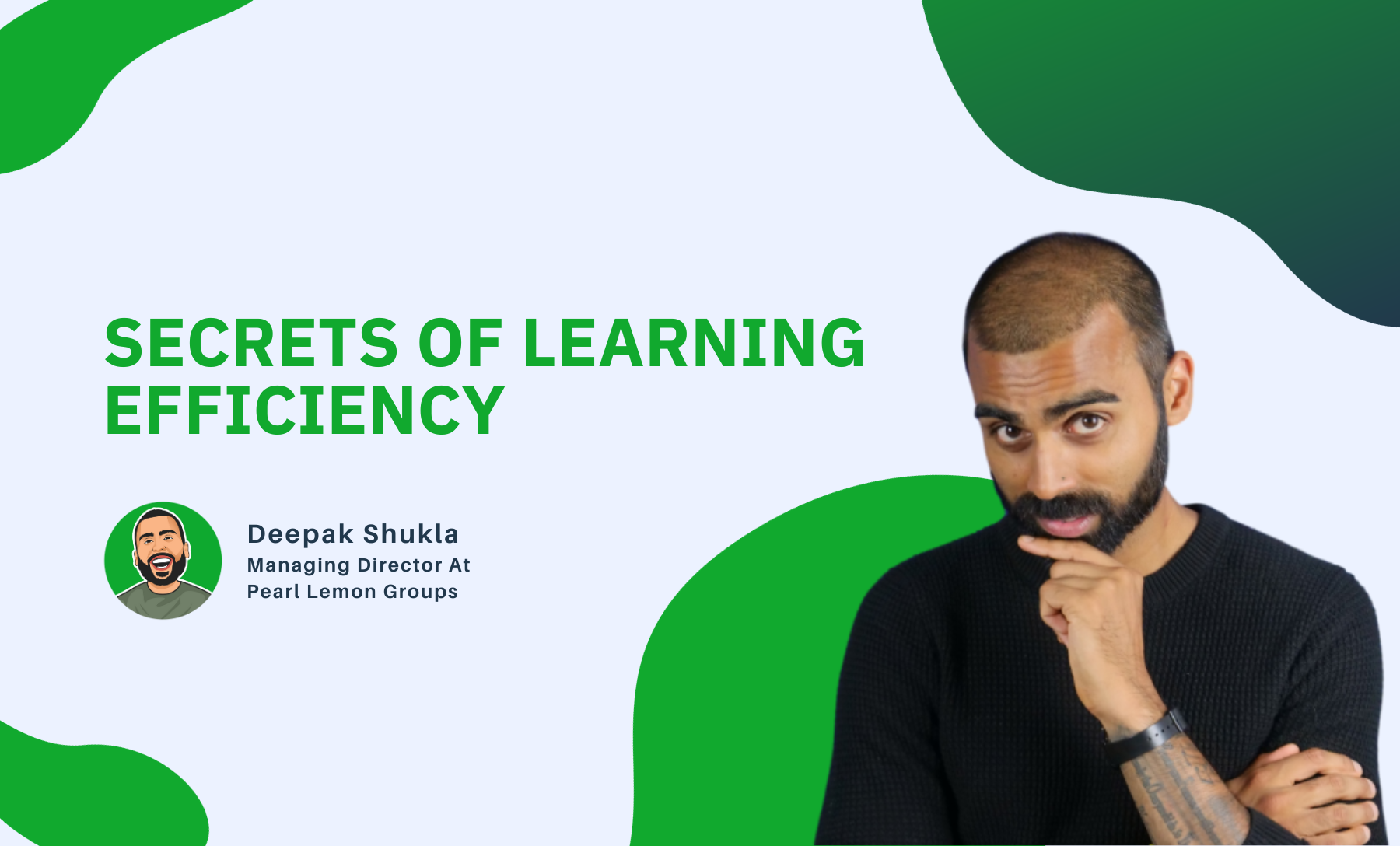Unlocking the Secrets of Learning Efficiency: Insights from “Learn Like a Pro”
Introduction
Hello, fellow knowledge seekers! Deepak Shukla here, and today, I’m excited to delve into the fascinating world of learning efficiency inspired by the book “Learn Like a Pro” by Barbara Oakley and Olav Schewe. This book has provided me with valuable insights into the art of learning and how our brains adapt and evolve as we accumulate knowledge.
The Power of Learning Networks ????
One of the intriguing concepts from “Learn Like a Pro” is that the more you learn, the faster you become at learning. It’s a fascinating idea that our brains are wired to connect different bodies of information, creating stronger retrieval networks. This means that as you accumulate knowledge, your brain becomes more adept at making associations and retrieving information efficiently.
As an entrepreneur, this concept resonates with me deeply. In the ever-evolving landscape of business and technology, the ability to learn quickly and adapt is invaluable. The more you understand and connect different aspects of your industry, the better equipped you are to make informed decisions and innovate.
“Continuous learning is the fuel that powers an entrepreneur’s journey to success.” — Deepak Shukla ????

Language Learning and Memory Cues ????
Another fascinating aspect discussed in the book is the relationship between learning new languages and the impact on previously acquired languages. It’s not about forgetting the old languages but rather how your brain manages retrieval cues. When you learn a new language, the cues in your mind may overlap with those of previously learned languages, creating moments of confusion.
This phenomenon is something I’ve experienced personally as I embarked on learning Italian while being proficient in Spanish. It’s a journey that can lead to some amusing mix-ups and challenges. Similarly, I’ve observed others, like my friend Daniella, who have become dominant in English, gradually experiencing difficulties in summoning cues for other languages.
The 10,000-Hour Rule and Space Repetition ⏰
The 10,000-hour rule, made famous by Malcolm Gladwell, suggests that mastery in any field requires roughly 10,000 hours of practice. In the context of “Learn Like a Pro,” we see how space repetition plays a crucial role in achieving that level of expertise. It’s not just about putting in the hours; it’s about spacing them out strategically for optimal learning.
As an entrepreneur, I understand the significance of dedicating time to mastering various aspects of my business. Whether it’s diving deep into tech startups, marketing strategies, or industry trends, the compound effect of continuous learning accelerates my ability to comprehend complex scenarios and make informed decisions.
The Compound Effect of Continuous Learning ????
The more you learn, the more efficiently you learn. It’s a concept that highlights the compounding nature of knowledge acquisition. Each new piece of information adds to your existing knowledge base, making it easier to grasp related concepts and expand your expertise.
In my entrepreneurial journey, this compounding effect has been evident. Reading extensively on various topics has allowed me to connect dots across different domains. This ability to see patterns and opportunities in diverse scenarios has been instrumental in my business ventures.

Conclusion
As we wrap up our exploration of “Learn Like a Pro” by Barbara Oakley and Olav Schewe, I want to leave you with this thought: continuous learning is not just a skill; it’s a superpower. Embrace the idea that the more you learn, the better you become at learning.
“In the world of entrepreneurship, the thirst for knowledge is the driving force behind innovation and success.” — Deepak Shukla ????????
So, keep expanding your learning networks, embrace the challenges of language learning, harness the power of space repetition, and watch how the compound effect of continuous learning propels you toward your goals. Thanks for joining me today on this journey of discovery. ????????
Key Takeaways
The Power of Learning Networks:
- The more you learn, the faster you can learn.
- Our brain connects different bodies of information, strengthening retrieval networks. This increases efficiency in making associations and retrieving information.
- This adaptability is vital for entrepreneurs in the ever-changing business and tech landscapes.
Language Learning and Memory Cues:
- Learning a new language can impact retrieval cues for previously acquired languages, sometimes leading to confusion.
- This isn’t about forgetting but rather how the brain manages and retrieves cues.
The 10,000-Hour Rule and Space Repetition:
- Mastery requires not just time but strategic spacing of practice sessions.
- The concept suggests that one needs about 10,000 hours of practice to master a skill, but the way those hours are distributed (space repetition) can make a significant difference.
The Compound Effect of Continuous Learning:
- Knowledge acquisition has a compounding nature.
- Each new piece of information integrates with your existing knowledge base, making it easier to understand related concepts and broadening your expertise.
Conclusion and Motivation:
- Continuous learning is a superpower.
- For entrepreneurs, a constant thirst for knowledge drives innovation and success.
- Embracing the concepts discussed can significantly boost personal and professional growth.
Remember: In the realm of learning and personal development, the journey and commitment to continuous learning are as crucial as the destination or the knowledge acquired. ????????????
Book Summary
“Learn Like a Pro” by Barbara Oakley and Olav Schewe delves into the science and art of effective learning, emphasizing that the more one learns, the faster and more efficient one becomes at acquiring new knowledge. Drawing from neuroscience and cognitive psychology, the book elucidates how our brains create and strengthen networks for information retrieval, the nuances of memory cues in language learning, and the importance of spaced repetition in mastering skills. Highlighting the compounding nature of knowledge, Oakley and Schewe provide readers with actionable strategies to optimize their learning processes and underscore the transformative power of continuous learning.




